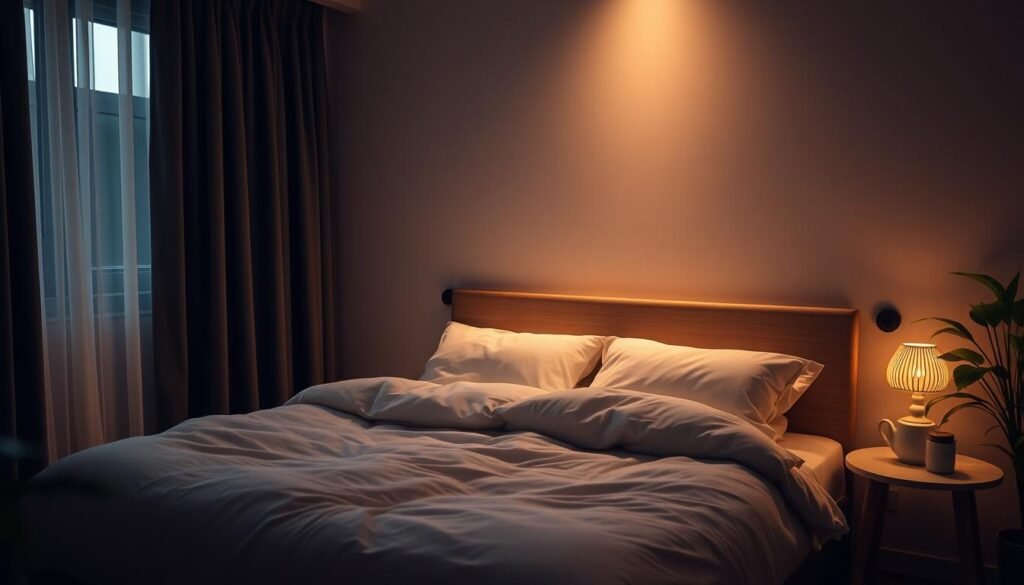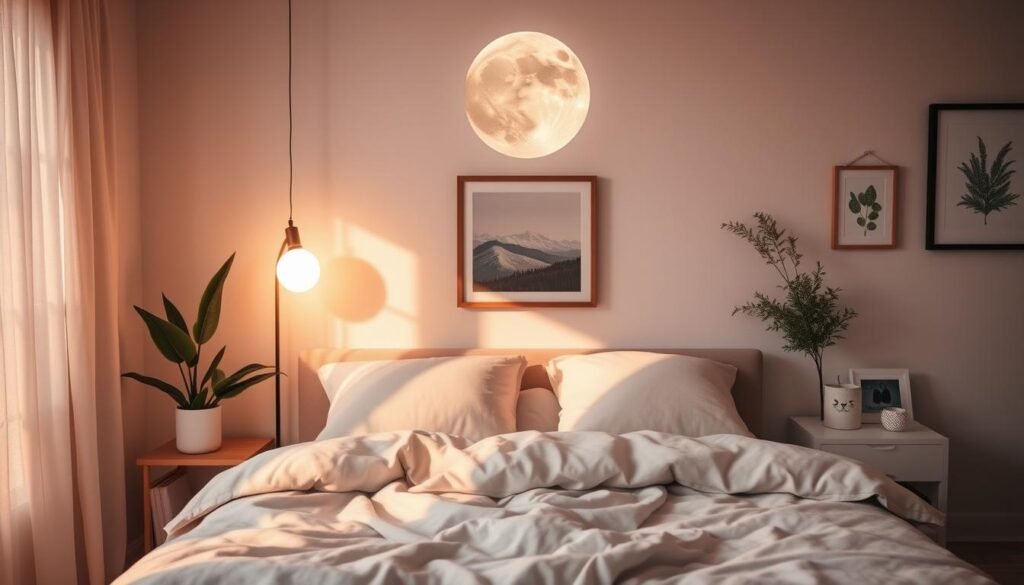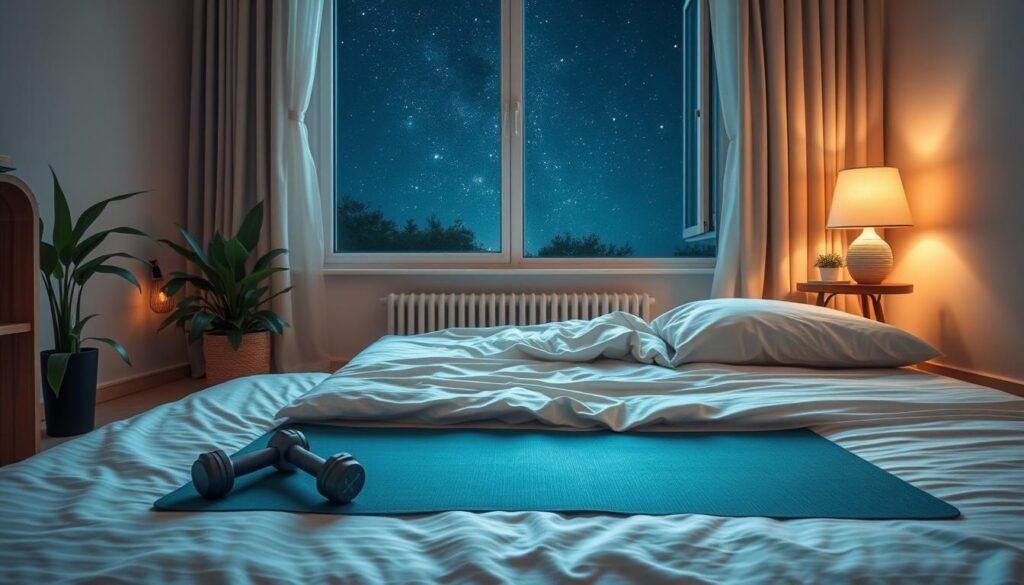Did you know over 35% of American adults don’t get enough sleep? Poor sleep quality can harm our health and minds. In this guide, we’ll dive into sleep science and share tips for better nights.
Key Takeaways
- Understand the importance of sleep stages and circadian rhythms for optimal rest
- Identify common sleep disorders and their impact on overall health
- Create the perfect sleep environment by managing temperature, lighting, and noise
- Discover the connection between sleep quality and mental well-being
- Develop a consistent sleep schedule and bedtime routine for better rest
Understanding the Science of Sleep Quality
Sleep is a complex process that’s key to our health and happiness. To grasp the value of sleep quality, we must explore its science. We’ll look at how sleep stages, circadian rhythms, and sleep times for different ages are connected.
The Role of Sleep Stages in Rest
The sleep cycle has different stages, each with its own role. These stages, from light to deep sleep, work together to refresh our body and mind. Knowing about each stage helps us understand sleep quality better.
How Circadian Rhythms Affect Sleep
Our body’s internal clock, or circadian rhythm, controls our sleep and wake times. It’s influenced by light, temperature, and our daily habits. Keeping our circadian rhythms healthy is key to good sleep.
Sleep Duration Requirements by Age
The right amount of sleep changes with age. Infants, kids, teens, and adults need different amounts for growth and health. Knowing these needs helps us get the sleep our bodies need.
“The best bridge between despair and hope is a good night’s sleep.”
– E. Joseph Cossman
Common Sleep Disorders and Their Impact
Sleep is key to our health and happiness. But, many struggle to get good sleep. Sleep apnea and insomnia are two big problems that affect our bodies and minds.
Sleep Apnea: This disorder makes you stop breathing while you sleep. It causes snoring and tiredness during the day. It happens when your throat muscles relax too much, blocking your airway.
People with sleep apnea might face heart issues like high blood pressure and heart disease.
Insomnia: It’s when you can’t sleep or stay asleep. It can be caused by stress, anxiety, or health problems. Long-term insomnia can hurt your thinking, mood, and work performance.
| Sleep Disorder | Symptoms | Potential Consequences |
|---|---|---|
| Sleep Apnea |
|
|
| Insomnia |
|
|
It’s crucial to know the signs of these sleep disorders. If you’re struggling, get help from a professional. With the right treatment, you can sleep better and feel better overall.

Creating the Perfect Sleep Environment
Getting quality sleep is more than just the hours you spend in bed. The sleep environment is key to a good night’s rest. This includes the right temperature, lighting, mattress, and pillows. Here are some tips to make your bedroom a sleep haven.
Optimal Room Temperature and Lighting
The best sleeping temperature is between 65°F and 70°F (18°C to 21°C). A cool room helps your body temperature stay steady, leading to better sleep. Also, avoid bright lights, as they can mess with your sleep cycle.
Choosing the Right Mattress and Pillows
A comfy and supportive mattress is crucial for sleep. Find one that fits your body’s shape and firmness. The right pillows also matter. They should keep your head and neck aligned for spinal health.
Managing Noise and Distractions
- Invest in blackout curtains or shades to block out any external light.
- Use a white noise machine or earplugs to minimize disruptive sounds.
- Avoid having TVs, computers, or smartphones in the bedroom, as the blue light emitted by these devices can interfere with your sleep.
By making your sleep environment cool, dark, quiet, and distraction-free, you’re setting up for a better night’s sleep. Remember, good sleep hygiene is vital for your health and happiness.
| Sleep Environment Factor | Optimal Range |
|---|---|
| Room Temperature | 65°F to 70°F (18°C to 21°C) |
| Lighting | Minimal to no light exposure |
| Noise Levels | Low to no disruptive sounds |

“The bedroom should be a sanctuary for sleep, not a hub of activity and stimulation.”
The Connection Between Sleep Quality and Mental Health
Getting enough sleep is key for both our bodies and minds. Lack of sleep deprivation can really affect our mood and how we think. Fixing sleep disorders helps our mental health a lot.
Research shows that not sleeping well can lead to depression, anxiety, and even thoughts of suicide. Without quality sleep, our brains struggle to manage emotions and focus. This can cause mood swings, irritability, and trouble concentrating.
But, good sleep can make us feel better mentally. It boosts our mental strength, improves thinking, and makes us more optimistic. By focusing on sleep and fixing sleep disorders, we can greatly improve our mental health.
The Bidirectional Relationship
The link between sleep and mental health goes both ways. Bad sleep can lead to mental health problems, but mental health issues can also mess with sleep. For example, people with anxiety or depression might have trouble sleeping, making their mental health worse.
| Sleep Quality Factors | Impact on Mental Health |
|---|---|
| Insufficient Sleep Duration | Increased risk of depression, anxiety, and cognitive impairment |
| Disrupted Circadian Rhythms | Mood swings, irritability, and difficulty regulating emotions |
| Insomnia or Other Sleep Disorders | Heightened stress, reduced mental resilience, and impaired decision-making |
Knowing how sleep and mental health are connected helps us take action. We can work on fixing sleep disorders, adopt healthy sleep routines, and get help when needed. This can lead to a more balanced and mentally healthy life.

“Improving sleep quality is one of the most powerful and effective interventions for enhancing mental health and well-being.”
Developing a Consistent Sleep Schedule
Creating a regular sleep schedule is key to good sleep hygiene. It helps our body’s natural rhythms work better. This leads to better sleep and more energy during the day. Let’s look at some ways to make a consistent sleep routine.
Bedtime Routines That Work
A calming bedtime routine tells your body it’s time to sleep. Some good methods include:
- Taking a warm bath or shower
- Engaging in light stretching or meditation
- Reading a book or listening to soothing music
- Avoiding screens and blue light an hour before bed
Doing these things every night helps your body learn to sleep better. This makes for a more restful night.
Weekend Sleep Patterns
It’s tempting to sleep in on weekends. But keeping a regular sleep schedule on weekends is good for your sleep hygiene. Try to go to bed and wake up close to your weekday times. This keeps your body’s natural rhythms in check.
Napping Guidelines
Naps can improve your sleep quality. But there are some rules to follow:
- Keep naps short, around 20-30 minutes, to avoid affecting your nighttime sleep.
- Nap early in the day, before 3 pm, to keep it from messing with your rhythms.
- Make sure your nap spot is comfy, dark, and quiet.
Following these napping tips helps you get the most out of your naps. It also keeps your sleep schedule consistent.

Getting a regular sleep schedule is a big step in bettering your sleep hygiene. Good bedtime routines, keeping weekend sleep patterns, and smart napping help your body’s circadian rhythms. This leads to better sleep, more energy, and overall well-being.
Nutrition and Sleep: What to Eat for Better Rest
What we eat greatly affects our sleep quality. Some foods and drinks can help us sleep better. We’ll look at how nutrition impacts sleep and what foods are best for rest.
Power Foods for Improved Sleep
- Tryptophan-rich foods, like turkey, eggs, and nuts, boost serotonin and melatonin. These help control our sleep-wake cycle.
- Magnesium-rich foods, such as leafy greens, bananas, and avocados, relax muscles and lower stress. This makes it easier to sleep.
- Whole grains, like brown rice and oats, have complex carbs. They help make sleep-promoting hormones.
Beverages for a Good Night’s Sleep
- Herbal teas, like chamomile and valerian root, calm the mind and body. They help you fall asleep faster.
- Warm milk has tryptophan and melatonin. It can make you feel sleepy.
- Drinking water is vital for health. It also helps improve sleep quality.
But, some foods and drinks can mess with sleep. Stay away from caffeine, alcohol, and spicy or heavy meals before bed. They can mess with your sleep cycle.
“Eating sleep-promoting foods and drinks daily can greatly improve your sleep. It also boosts your overall health.”

Choosing the right foods and drinks can greatly improve your sleep. Remember, being consistent and balanced is key. This way, you can get the restful nights you need.
Physical Activity’s Role in Sleep Quality
Physical activity and sleep quality are closely linked. Regular exercise can greatly improve how long and well you sleep. Knowing when and what to exercise can help you sleep better.
Best Time for Exercise
Timing is key when it comes to exercise for better sleep. The best time is usually late afternoon or early evening, 4-6 hours before bed. This helps your body temperature rise and then fall, aiding in sleep.
Types of Exercise for Better Sleep
- Aerobic Activities: Activities like brisk walking, cycling, or swimming can help. They reduce stress, release endorphins, and regulate your body’s clock.
- Resistance Training: Exercises like weightlifting or bodyweight workouts can also help. They reduce muscle tension and make you tired, leading to better sleep.
- Yoga and Stretching: Gentle yoga and stretching can calm your mind and body. They help relieve stress and tension that can disrupt sleep.
It’s important to find exercises you enjoy and can do regularly. Try different activities to see what improves your sleep the most.

“Regular physical activity can be one of the most effective ways to improve sleep quality and duration. By engaging in the right type of exercise at the optimal time, you can harness the power of your body to achieve more restful and rejuvenating nights.”
Technology and Sleep: Finding the Balance
In today’s world, technology plays a big role in our lives, including how it affects our sleep. New tech has many benefits, but we need to balance it with good sleep habits. This ensures we get the rest we need.
Devices like phones, tablets, and laptops give off blue light. This light can mess with our body’s natural sleep cycle. Also, the constant alerts and info can keep our minds racing, making it hard to relax before bed. To help, try to avoid screens for at least an hour before sleep. You can also use apps that reduce blue light.
But, technology can also help us sleep better. Apps and wearables track our sleep, showing us how to improve. Yet, it’s important not to overuse them. Too much focus on sleep data can lead to stress and anxiety about sleep.
FAQ
What are the different sleep stages and how do they impact rest?
Sleep has several stages, like light sleep and REM sleep. Each stage is important for rest. They help the body and mind recover.
How do circadian rhythms affect sleep patterns?
Circadian rhythms control our sleep-wake cycles. They are like an internal clock. Disruptions can cause sleep problems and affect quality.
How much sleep do I need based on my age?
Sleep needs change with age. Newborns need 14-17 hours. Adults usually need 7-9 hours for health.
What are the common sleep disorders, and how do they affect sleep quality?
Sleep disorders like sleep apnea can harm sleep quality. They need professional help to manage.
How can I create the perfect sleep environment?
A good sleep environment is key. Keep the room cool, use comfy bedding, and reduce noise and light. A calm atmosphere helps too.
What is the connection between sleep quality and mental health?
Bad sleep can hurt mental health. It can lead to depression and anxiety. Good sleep is vital for mental well-being.
How can I develop a consistent sleep schedule?
A regular sleep schedule is important. Stick to a bedtime and wake-up routine. Avoid changing your sleep times, especially on weekends.
What foods and beverages can help or hinder sleep?
Some foods, like those with tryptophan, help sleep. But caffeine and alcohol can hurt it. What you eat affects your sleep.
How does physical activity affect sleep quality?
Exercise can improve sleep. But, do it early in the day. It helps you sleep better at night.
How can I balance technology use and ensure it doesn’t negatively impact my sleep?
Too much screen time before bed can mess with sleep. Make a tech-free bedtime routine. This improves your sleep.

Hello, I’m Jimmy, founder of Jimmy Cozy Life. I’m here to help you create a home that feels warm, stylish, and balanced. With ideas for decor, celebrations, wellness, and DIY projects, my goal is to share practical tips and a bit of inspiration to make your space truly special.
Disclosure: This post contains affiliate links. If you click and make a purchase, we may receive a small commission at no extra cost to you. The content on this website was developed with assistance from AI.



